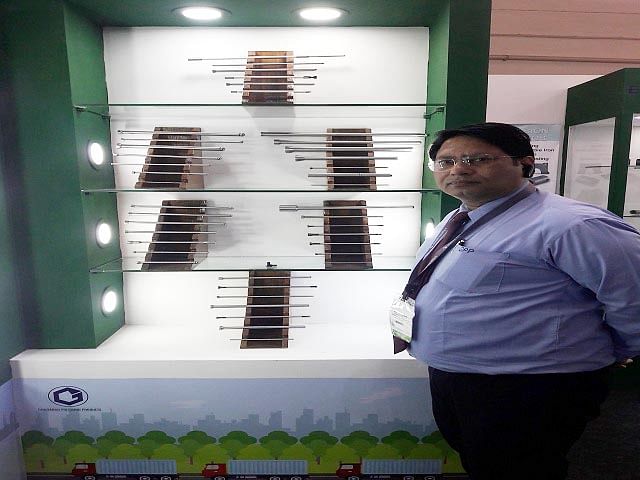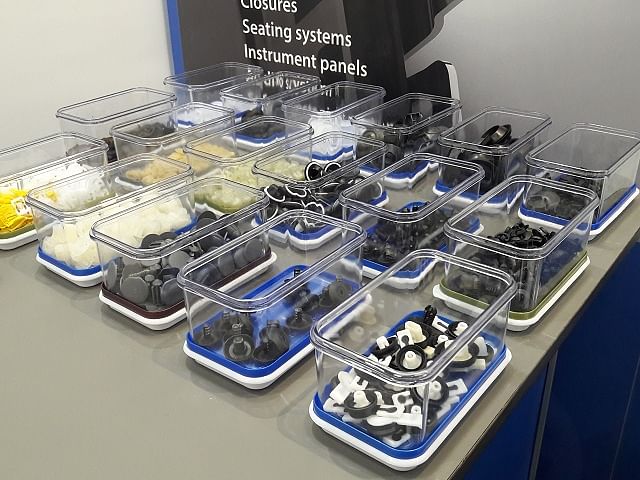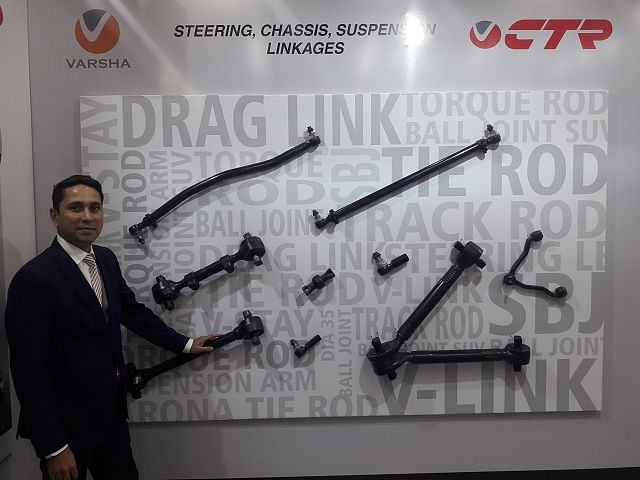India's attractive auto aftermarket draws new players
A growing new vehicle parc and an ageing fleet are drawing a number of new players into the Indian aftermarket. Amit Panday met a few at the ACMA Automechanika New Delhi trade fair held in March this year.
A growing new vehicle parc and an ageing fleet are drawing a number of new players into the Indian aftermarket. Amit Panday met a few at the ACMA Automechanika New Delhi 2017 trade fair.
The Indian automotive component industry had reported a turnover of US$ 39 billion in FY2015-16, which marked its contribution to the GDP to 2.3 percent. Besides supplies to OEMs and the aftermarket, the turnover also included export business fetching foreign exchange earnings worth US$ 10.81 billion, which was four percent of India overall exports for that fiscal.
The size of the domestic aftermarket in FY2015-16 stood at US$ 6.8 billion or Rs 44,600 crore. This grew to US$ 8.4 billion or Rs 56,098 crore in FY2016-17, up by an impressive YoY growth of 25.78 percent. According to a study released by the Automotive Component Manufacturers Association of India (ACMA), the Indian aftermarket industry is estimated to reach a size of Rs 75,705 crore by 2019-20, thereby exhibiting a CAGR of 10.5 percent.
A growing vehicular population and the ageing existing fleet are two directly related factors that impact aftermarket requirements. At the third edition of the ACMA Automechanika in New Delhi, held between March 21-24, Autocar Professional caught up with a number of first-time participants (at the B2B fair) and companies that are planning to foray into the automotive aftermarket segment soon. Among the prominent names that plan to venture into the aftermarket space are KCTR Varsha Automotive, ARaymond Fasteners and Ghaziabad Precision Products.
ARaymond Fasteners India, the local arm of the French supplier of fastener solutions to the automotive industry ARaymond Group, is planning to an entry into the Indian aftermarket. The move supports the aggressively growing company, which has reported a turnover of close to Rs 163 crore for CY2016 as against its turnover of Rs 75 crore in CY2014.
Speaking to Autocar Professional earlier, Manish Padharia, managing director, ARaymond Fasteners India, had revealed that the company plans to notch 40 percent YoY growth until 2018-19. The company manufactures and supplies different types of clipping fasteners (also known as non-threaded fasteners) to the passenger car, commercial vehicle and two-wheeler segments.
Gearing up for growth, ARaymond Fasteners India is also in the process of finalising production expansion at its plant in Chakan, which is currently built on a company-owned land parcel of 7.5 acres. The current plant occupies only two acres of land leaving enough scope for expansion at the site.
Ghaziabad Precision Products (GPP), a 29-year-old Tier 1 supplier of critical valvetrain components, is also considering an entry into the aftermarket in FY2017-18. Kartar Mathur, general manager – marketing, GPP, says that 65 percent of his company’s total production currently goes to the OEMs for domestic requirements. “Around 35 percent of our production is exported. Although we are not currently present in the aftermarket space, we are planning to enter and set up our network in FY2017-18.”
The Rs 135 crore company, according to the senior official, has marked a YoY growth of 25-30 percent in FY2016-17. GPP manufactures and supplies valvetrain parts for the diesel engines used in CVs, tractors and off-highway segments. The company is also a single source supplier of pushrods to Royal Enfield motorcycles.
“We make parts such as tappets, pushrods, rocker shaft assemblies, valve-bridge, spigot assembly and others. We make everything which is basically camshaft driven. Our products are supplied to all the tractor makers except John Deere in India,” he disclosed.
The company website states, “GPP produces 12 million pushrods per annum, in three factories specialising in solid forged, solid welded, projection welded and press fit type. These pushrods are being supplied to diesel engines in the heavy horsepower segment, on-road vehicles, off-road vehicles, generators, tractors, small engine / diesel segment.”
GPP’s long client list includes Tata Motors, Ashok Leyland, CK-Birla backed Avtec, Escorts, Swaraj Mazda, TAFE, Eicher, Sonalika International, Daimler, Mahindra & Mahindra, SML Isuzu, MAN, CAT, JCB and many others.
Kartar agrees that with the shift to the complex BS VI emission norms, the engine repair and fitments business in the unorganised aftermarket will see a dramatic decline. “Only educated, trained and skilled technicians will be able to perform the engine repair jobs in the aftermarket once the sophisticated BS VI-compliant engines start coming into the market from 2020,” he stated.

Ghaziabad Precision Products' Kartar Mathur "We make everything which is basically camshaft driven. Our products are supplied to all the tractor makers."
The company has two manufacturing facilities in Ghaziabad and one plant in Sitarganj (Uttarakhand), which also has a foundry unit.
KCTR Varsha Automotive, a Pune-based Tier 1 supplier that manufactures steering linkages such as drag links, tie rods, ball joints and chassis-suspension parts, is also working on a plan to enter the aftermarket soon.
Revealing the reasons, Piyush J Munot, director, KCTR Varsha Automotive, said, “We are a Tier 1 supplier and our main play will continue to remain with the OEMs. While we supply critical parts to the OEMs, the byproduct for us will be the aftermarket space. Our priority is to supply to the OEMs and to improve overall parts safety. How we grow in the aftermarket is primarily based on the abuse that our parts in the vehicles are subjected to. This includes driving on bad roads, damage due to accidents and other factors. This is where we will find the requirement (of our parts) in the aftermarket. We have to be present there. On the other hand, the OEMs will naturally offer these parts but there is the independent aftermarket that we want to cater to.”
The company, which had its first go-to-market event at the ACMA Automechanika in New Delhi, is yet to decide on specific strategies for the same. According to Munot, the company may approach the distributors and their sub-dealers of the four zones across India (north, south, east and west) or also join hands with the large distributors who are currently dominating the aftermarket in their respective regions.
Munot believes that technology breakthroughs will continue to hit the aftermarket. “We have achieved some major breakthroughs based on our advanced technology. However, on the flip side, this technology improvement has hit the aftermarket. For example, if a ball joint or a ball pin is being changed in the aftermarket after every 30,000-40,000km, now with our products, these frequent changes are not required,” he said.
Munot, however, strongly backs the initiatives to educate the local garage owners and technicians about the importance of using authentic and genuine spare parts in the aftermarket, an activity that was performed by ACMA as part of its Safer Drives initiative on the sidelines of the four-day trade fair in New Delhi.

ARaymond India, which is to expand its Chakan plant, is to supply its non-threaded fasterners to the aftermarket soon.
INTERVIEW; PIYUSH J MUNOT, DIRECTOR, KCTR VARSHA AUTOMOTIVE
Since KCTR Varsha Automotive has participated for a second time at the ACMA Automechanika New Delhi trade fair, what do you think of this platform?
This is a good platform. The visitors who attend this event are coming with a clear agenda, which is pure B2B. There is no B2C story playing here because there is no consumer who is coming here to buy a part.
Most of the players here are not the dealers and distributors but are the manufacturers, who are displaying their products here. The majority of them are looking at creating their B2B market, which is to find channel partners through this platform. We are looking at setting up a structure wherein we can look at institutional sales and create a long-term play in the market.
Do you see price sensitivity in the aftermarket, particularly for CV spare parts, as a big challenge?
I think the challenge really lies in educating the customer(s). When you educate the customers, they are ready to pay an extra price for the right technology and durability. In the CV business, the driver is mostly the decision maker. When his vehicle breaks down and he is at a local dealership, he has to make a decision based on his knowledge. Fortunately, he is also the consumer of that part, so safety, durability and other factors are all in his hands.
Therefore, I think the education part over a period of time, which we will have to focus upon, is what will fetch us opportunities in the market. The evolution in technology always comes for a price. The same is true if we look at the ongoing emissions upgrade in the market.

'The challenge really lies in educating the customer(s). When you educate them they are ready to pay an extra price for the right technology and durability.'
ACMA’s Safer Drives initiative sees it educate mechanics about the difference between fake and original parts. Schaeffler too, on the sidelines of this platform, is bringing local garage owners and mechanics and educating them. Do you plan to chalk out similar exercise(s) in the near future?
This is a step-wise process because as a manufacturer if we have to go to the level of local mechanics, it takes time. But it has to percolate down and can be done via road shows or events like these. We can also go to large pockets, which have a large consumer profile (fleet owners, distributors with large workshops) and educate them there.
So there are multiple ways to do this and it will be based on a multi-pronged strategy to pull this off. Events like these are also helpful in terms of the organisations bringing their key stakeholders to this platform and educating them.
Coming to the ACMA Safer Drives, I think, the fundamental thing here is to ensure that people are able to understand the difference between the asli and naqli parts, and what the original parts bring with them for the price gap (safety, durability, comfort, better environment).
We entered this space because we wanted to bring safety and durability to these parts on the roads. This is what, I believe, is our USP.
How was FY2016-17 for Varsha Forgings and KCTR Varsha Automotive? What is your forecast for FY2017-18?
I would say that we are a relatively new player in this segment (sealed ball joint technology under KCTR Varsha Automotive. The company is a new player in the area of steering linkages that include drag links, tie rods and ball joints and suspension parts like torque rod and V-rod. KCTR Varsha Automotive is reportedly gaining foothold with all major OEMs in India.)
Our technology has now given us a boost this year; in our product segment(s), we have grown anywhere between 3x to 4x. While this is not the trend of the market, this is because of the introduction of our products across different vehicles, product lines, and OEMs. Therefore, the growth in this year (FY2017) has been phenomenal. We anticipate similar growth in FY2018.
If I keep our growth aside and look at the market, I think the CV business typically follows the GDP growth. It either remains at par or slightly above the GDP growth. So as long as the GDP remains around 7 percent, the CV industry will remain at a healthy two-digit growth. The different CV segments, however, will grow according to their own patterns. For example, the SCVs are poorly performing currently. For us, the entire spectrum is important. We have to have a balanced portfolio.
The group comprises of different businesses — steering business, forgings, suspension — which is a forward integration of the forging business and the chassis business. All put together, we have closed FY2016-17 with a turnover of close to Rs 500 crore. Carrying the steam forward into the new fiscal, we anticipate that we would close FY2017-18 with a turnover of roughly Rs 600 crore (20 percent growth YoY across the board).
This industry feature was first published in Autocar Professional's April 15, 2017 issue
RELATED ARTICLES
RSB Group Prepares for Hyper-Growth: New Markets, Tech and Mission ₹10,000 Cr
From a small workshop in Jamshedpur to an engineering group with global reach, RSB Transmissions is preparing for its mo...
Beyond Helmets: NeoKavach Wants to Make Rider Airbags India’s Next Safety Habit
As premium motorcycles proliferate and riding culture evolves, an Indo-French venture is betting that wearable airbags, ...
Inside Mahindra Last Mile Mobility’s Rs 500 Crore Modular Platform Strategy
Mahindra Last Mile Mobility has launched the UDO, an electric three-wheeler built on a new Rs 500-crore modular platform...






 15 May 2017
15 May 2017
 18537 Views
18537 Views





 Darshan Nakhwa
Darshan Nakhwa



 Shahkar Abidi
Shahkar Abidi

